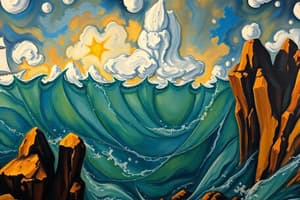Podcast
Questions and Answers
What did Henry Hess propose to explain the movement of the continents?
What did Henry Hess propose to explain the movement of the continents?
- Seafloor spreading (correct)
- Tectonic plate subduction
- Mantle convection
- Continental drift
What occurs when the oceanic crust diverges away from deep mid-ocean ridges?
What occurs when the oceanic crust diverges away from deep mid-ocean ridges?
- Seafloor spreading (correct)
- Subduction
- Continental drift
- Mantle convection
What evidence supported Henry Hess's theory of seafloor spreading?
What evidence supported Henry Hess's theory of seafloor spreading?
- Fossil records in oceanic rocks
- Magnetic stripes in oceanic rocks (correct)
- Surface erosion patterns on oceanic rocks
- Sedimentary layers in oceanic rocks
What is one mechanism that scientists have theorized to cause plate movement?
What is one mechanism that scientists have theorized to cause plate movement?
What do the 'striped' seafloor rocks hold a record of?
What do the 'striped' seafloor rocks hold a record of?
What drives plate movements according to the text?
What drives plate movements according to the text?
What geological changes can tectonic plate movements cause?
What geological changes can tectonic plate movements cause?
What is the main cause of earthquakes according to the text?
What is the main cause of earthquakes according to the text?
How are divergent boundaries characterized according to the text?
How are divergent boundaries characterized according to the text?
What geological process can create volcanoes through melting of mantle rock into magma according to the text?
What geological process can create volcanoes through melting of mantle rock into magma according to the text?
Flashcards are hidden until you start studying
Study Notes
- Convection is a process where materials move due to heat and density differences, leading to the circulation of heated and cooled particles.
- In Earth's mantle, hot and less dense rocks rise, while cooler and denser parts sink.
- Plate movements are driven by three main theories: mantle convection, ridge push, and slab pull.
- Plates move at rates of 1-10 centimeters per year, with three main types: divergent, convergent, and transform.
- Divergent boundaries occur when plates move apart, resulting in rift valleys and volcanic activity.
- Convergent boundaries occur when plates collide, leading to mountain building, earthquakes, and volcanic activity.
- Transform boundaries occur when plates slide past each other, causing friction and earthquakes.
- Tectonic plate movement can cause various geological changes, including volcanic activity, earthquakes, mountain building, and continental drift.
- Once a giant landmass called Pangaea, Earth's continents separated and moved into their current configurations due to plate movements.
- Tectonic plate movements generate heat and energy, leading to the formation of different types of mountains through uplift, folding, and volcanic activity.
- Earthquakes occur when the energy released by plate movements creates faults in the Earth's crust.
- Hot spots, or mantle plumes, can create volcanoes through the melting of mantle rock into magma, which then rises and forms a volcano on Earth's surface.
- Stress created by plate movements is a significant factor in the occurrence of earthquakes.
Studying That Suits You
Use AI to generate personalized quizzes and flashcards to suit your learning preferences.




